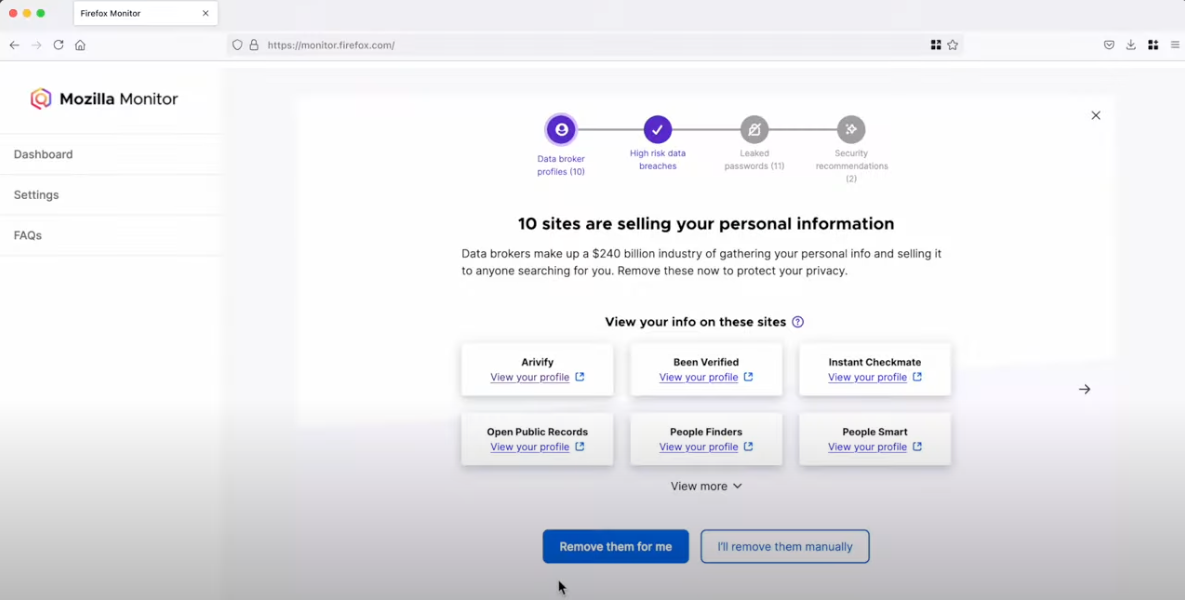In March 2024, Mozilla said it was winding down its collaboration with Onerep — an identity protection service offered with the Firefox web browser that promises to remove users from hundreds of people-search sites — after KrebsOnSecurity revealed Onerep’s founder had created dozens of people-search services and was continuing to operate at least one of them. Sixteen months later, however, Mozilla is still promoting Onerep. This week, Mozilla announced its partnership with Onerep will officially end next month.

Mozilla Monitor. Image Mozilla Monitor Plus video on Youtube.
In a statement published Tuesday, Mozilla said it will soon discontinue Monitor Plus, which offered data broker site scans and automated personal data removal from Onerep.
“We will continue to offer our free Monitor data breach service, which is integrated into Firefox’s credential manager, and we are focused on integrating more of our privacy and security experiences in Firefox, including our VPN, for free,” the advisory reads.
Mozilla said current Monitor Plus subscribers will retain full access through the wind-down period, which ends on Dec. 17, 2025. After that, those subscribers will automatically receive a prorated refund for the unused portion of their subscription.
“We explored several options to keep Monitor Plus going, but our high standards for vendors, and the realities of the data broker ecosystem made it challenging to consistently deliver the level of value and reliability we expect for our users,” Mozilla statement reads.
On March 14, 2024, KrebsOnSecurity published an investigation showing that Onerep’s Belarusian CEO and founder Dimitiri Shelest launched dozens of people-search services since 2010, including a still-active data broker called Nuwber that sells background reports on people. Shelest released a lengthy statement wherein he acknowledged maintaining an ownership stake in Nuwber, a data broker he founded in 2015 — around the same time he launched Onerep.




I wonder how much Dimitiri was paying Mozilla to offer his service.
There must have been a profit motive for Mozilla to delay Dumping this guy.
How about the popular services like DeleteMe and Incogni? Are they worth exploring? Asking for a friend.
I’ve not dealt with those services personally, so I can’t comment on them. But now I do wonder how active Mozilla has been in trying to find a suitable replacement at that price point that wasn’t also ethically fraught. If you take them at their word, you might conclude that maybe it’s best to take matters into your own hands instead of relying on these companies to protect you.
I think it’s worth exploring. I found a CNBC article on the topic at https://www.cnbc.com/select/best-data-removal-services/ and will be reading it more thoroughly soon.
I have tried going the DIY route. It could be a full time job. These data brokers do everything they can to make it hard and in some cases impossible to remove information. They make extensive use of third party scripting, tracking, dark patterns and who knows what else.
Unless there is some sort of legal control applied, this whole data broker industry is just an ongoing whack-a-mole game.
“but our high standards for vendors” coupled with our medium-low tolerance for public shaming…
Quite true, mealy.
I cannot decide if ersatz ‘services’ like this are supposed to be thought of as a solution or are more of the problem. Better go grab your thinking cap and find out.
Data broker removal services are a complete and total scam, but the monitoring aspect of Mozilla’s service is at least potentially useful.
Don’t believe me? Count the number of sources your data is removed from by the service and compare to the number of actual sources that still store your data – they account for such a tiny percentage of data sources that it’s pathetic at best and fraudulent at worst.